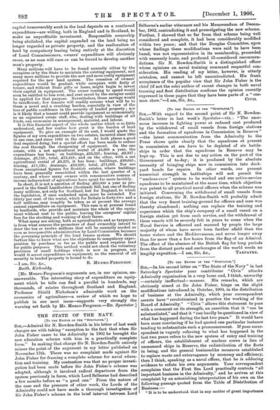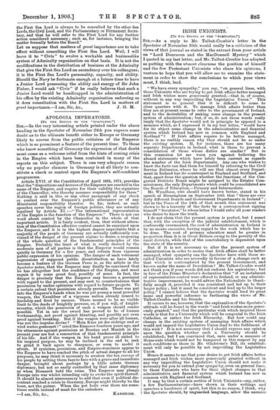[To THE EDITOR OF TES "SPECTATOR."]
SIR,—In his second letter on "The State of the Navy" in last Saturday's Spectator your contributor " Civis " attacks Admiralty organisation in a very loose and, I think, unworthy —certainly ineffectual— manner. His remarks, which are obviously aimed at Sir John Fisher, hinge on the slight modifications introduced in October, 1904, in the distribution of business at the Admiralty, which your correspondent asserts have "revolutionised in practice the working of the Board of Admiralty." " Civis " allows this statement to pass with a comment on its strength, an assertion that it "can be substantiated," and that it "can hardly be questioned in view of what has happened during the last two years." It would have been more convincing if he bad quoted one particular instance tending to substantiate such a pronouncement. If your corre- spondent in vaguely referring to what has happened in the last two years refers to the new system of entry and training of officers, the establishment of nucleus crews in lieu of unmanned ships in Reserve, the redistribution of the fleets in being, and the general businesslike measures established to replace waste and extravagance by economy and efficiency, then I think, speaking as a naval officer, that he is adducing evidence to refute his own arguments. Your correspondent complains that the First Sea Lord practically controls "all important business in the Admiralty," and he arrives at this complaint by an astonishing interpretation of his own on the following passage quoted from the Table of Distribution of Business :— "It is to be understood that in any matter of great importance the First Sea Lord is always to be consulted by the other Sea Lords, the Civil Lord, and the Parliamentary or Permanent Secre- tary, and that he will refer to the First Lord for any further action considered necessary ; such as, for instance, bringing the matter formally before the Board."
Let us suppose that matters of great importance are to take effect without consulting the First Sea Lord. Well, I will
leave it to " Oivis " to evolve a workable and businesslike system of Admiralty organisation on that basis. It is not the modifications in the distribution of business at the Admiralty that give the First Sea Lord an ascendency over his colleagues; it is the First Sea Lord's personality, capacity, and ability. Should the Navy be fortunate enough at a future time to have a Junior Lord possessing the ability and energy of Sir John Fisher, I would ask " Civil:3" if he really believes that such a Junior Lord would be handicapped in the administration of his office by the existing Admiralty organisation enforcing as it does consultation with the First Sea Lord in matters of
great importance.—I am, Sir, &c., J. G. M.































































 Previous page
Previous page